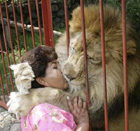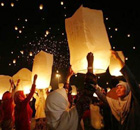Shoreline ingredients for success
(Agencies)
Updated: 2009-12-25 09:11
 |
Large Medium Small |
 |
|
Chef Rene Redzepi in his restaurant Noma in Copenhagen.[Agencies] |
Michelin-starred Danish cook Rene Redzepi puts his life on the line in search of the local flavors that have catapulted his "Nordic cuisine" into the international spotlight.
Nothing that is not native to Scandinavia, and seasonal, can be spotted on his menus. And some of the more exotic ingredients have been discovered in the forests and along the shorelines of his home, by an unusual but time-honored method.
"We just eat things. If you work a lot with products you can see what looks succulent, if you just put it in your mouth and you bite a little bit, usually nothing happens," he says. "As long as you don't swallow, you just put it in your mouth and let your tongue taste it, nothing really bad can happen. You can have an unpleasant 10 minutes, but that is it," he says.
Redzepi has scooped up international plaudits by being as rigorous about his cooking as he is cavalier about his health.
When he started Noma restaurant - the name comes from the Danish words for Nordic and food - six years ago, it was derided by locals, who thought it would be a flash-in-the-pan and joked about cooking gourmet whale blubber and seals.
Instead, he has soared through the rankings of Restaurant magazine's list of the World's 50 Best Restaurants to secure third place behind contemporary legends El Bulli and The Fat Duck - and Redzepi himself was this year voted "Chef's chef" by those who run the other 49 top eateries.
He has done it partly by using just local, seasonal ingredients. There are no tomatoes or citrus fruits, no olive oil, garlic or foie gras in his dishes, no wines in the sauces.
His techniques and the composition of his menu are also unusual. There are more vegetables than meat, and much of the food is not even cooked - although it comes with exquisite sauces that take hours or days of preparation.
A tasty menu includes raw squid and beef, and wild flowers and seaweed. There is even a dish made almost entirely of onions of different sizes and shape, boiled, pickled and reduced.
He also does a lot of old fashioned preserving of spring and summer ingredients, and makes unusual winter desserts with vegetables, to stick to his seasonal principles.
"We do a lot of smoking, a lot of pickling ... it is difficult to get all the spices and diverse flavors that you need in January and February. That is what people used to do, but of course back then it was to survive, now it is just for flavor."
Redzepi's interest in wild food is deep and personal, inspired in part by long spells of his childhood spent in his father's native Macedonia, where "you lived on what you grew".
Noma now has four foragers supplying it, but he still often sets out to collect his own ingredients at 6 or 7 am.
"We drive one hour away from here on the shoreline and pick beach plants for instance," he says. One of his favorite finds is a herb which "looks like a chive but tastes like coriander".
Regular 16-hour work days have left him little time to follow the politics of global warming which unfolded at a UN-led summit just a few metro stops away from his restaurant last week.
But through his cooking he sees the impact of change in the ecosystems on which he relies.
"It is warmer than five years ago I think. Whether it's climate change I don't know, but our lumpfish roe for instance, which is the first sign of spring in the sea, used to come in early March but last year we had it in late January," he says.
And journeys of exploration around the region, hunting out unique local foods and recipes have also made him as committed to sustainability in both farmed and wild food as the most seasoned green protester outside the climate negotiations.
"You can't cook seal or whale or all these things, and I don't cook eel. I don't cook cod. Products like that which are disappearing."
He is equally rigorous about wild vegetables. "You need to know how to pick things, because you can't just harvest and harvest and harvest. You have to learn how things grow, so you aren't just erasing the environment."









